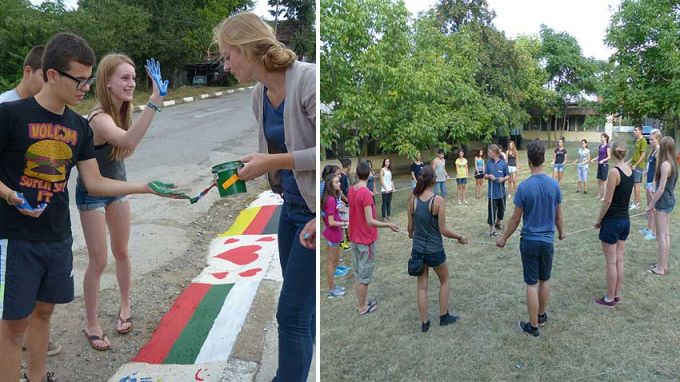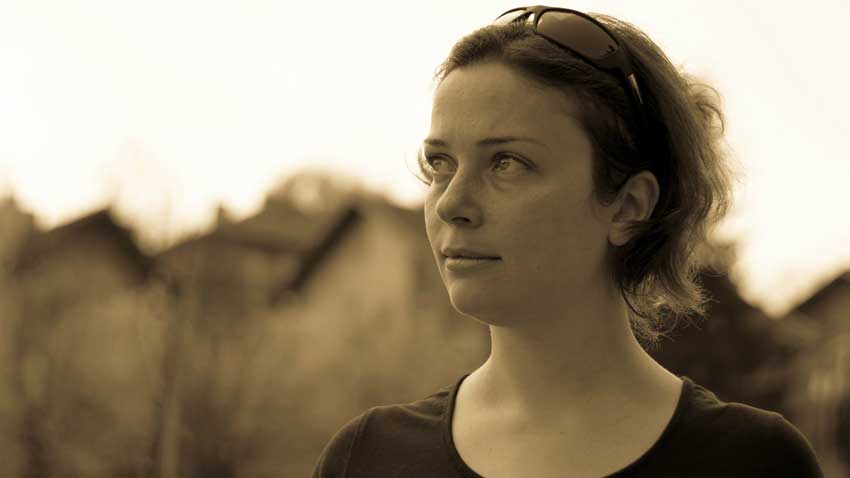
Why is it that consumerism has been elevated to the rank of a principal value and shopping therapy to a way of healing the spirit? What does satisfying human greed take out of nature?
With these and other questions like them, the Ecocentric foundation will provoke young Bulgarians to stop and think about consuming intelligently, motivating them to a responsible attitude to society and the environment, traveling the road from ego- to eco-centric. For the purpose its team has developed an interactive project targeted at school children from the 8th to the 12th grade. The idea for the project comes from Germany where it has been working successfully for 12 years. The financing is from Deutsche Bundesstiftung Umwelt, a German environmental foundation and to begin with, it will be applied at schools in major towns in Western Bulgaria – Sofia, Vratsa, Lovech, Plovdiv, Blagoevgrad and Pazardjik. The training takes place out in the open as urban tours are organized focusing on food, clothing, cosmetics, transport, electronic gadgets.
 “The urban tours will have several stopovers just as people do when they go sight-seeing, but this time the focus is on the items from the agenda of the educational consumption programme,” says Hristina Bancheva, director of the foundation. “For example one of the stopovers will be for coffee, the next for chocolate, then for clothes, we have also included the mobile gadgets young people are so fond of. During the tour we play out different interactive games, change into different costumes, get to know more about the ingredients that go into different foodstuffs. We get them to think about where the products we use come from. Take for example cotton – it is produced in one place, the material is made somewhere else and the item of clothing then has to travel thousands of kilometers to reach us. That is why local production is more environment-friendly and we should opt for it.”
“The urban tours will have several stopovers just as people do when they go sight-seeing, but this time the focus is on the items from the agenda of the educational consumption programme,” says Hristina Bancheva, director of the foundation. “For example one of the stopovers will be for coffee, the next for chocolate, then for clothes, we have also included the mobile gadgets young people are so fond of. During the tour we play out different interactive games, change into different costumes, get to know more about the ingredients that go into different foodstuffs. We get them to think about where the products we use come from. Take for example cotton – it is produced in one place, the material is made somewhere else and the item of clothing then has to travel thousands of kilometers to reach us. That is why local production is more environment-friendly and we should opt for it.”
The tours will be organized at the end of June with guides – trained volunteers, young people aged under 35 who have taken sustainable and environmentally friendly development to heart. They will get to meet volunteers from Germany online to comment on problems connected with consumer education and together, work towards a uniform intelligent consumption vision of Europe. A school contest will be launched in March.
“The contest is for secondary school students who will themselves be looking into items from the consumer educational programme like clothes, chocolate and electronic mobile devices, as these are the products young people use most,” Mrs Bancheva says. “They will get to know the life cycle of the products we use and find out what the impact of their manufacture and use is on the environment and society and make an information board for their school with the results they have obtained. The principal idea of the contest is to generate an environmental advert and bring products that are more environment-friendly and socially responsible to the attention of their school friends.”
English version: Milena Daynova
The Bulgarian national minority in Albania is one of the largest in the country, according to data from the latest official population census. A total of 7,057 individuals identified as Bulgarians. For comparison, 23,000 people identified as Greeks,..
From today, residents of Stara Zagora, young and old, can send their letter to Santa Claus. A letterbox has been set up in the foyer of the city's State Puppet Theatre to collect messages for Father Christmas. The cultural institution guarantees that..
A Christmas tree with Bulgarian decorations has been placed in a central location at the Griffin Museum of Science and Industry in Chicago. For the fifth consecutive year, Bulgarians living in Chicago crafted the lavish decoration of the Bulgarian..
Over 3.5 million Ukrainians have arrived in or passed through Bulgaria since the beginning of the war. Nearly 200,000 people have found temporary..
At the Bulgarian Embassy in London, Prof. Bettany Hughes presented excerpts from the new BBC series - Wonders of Bulgaria. Prof. Bettany..
An innovation for the treatment of diabetic foot ulcer using the patient's own tissue and artificial intelligence has been implemented at the University..

+359 2 9336 661
